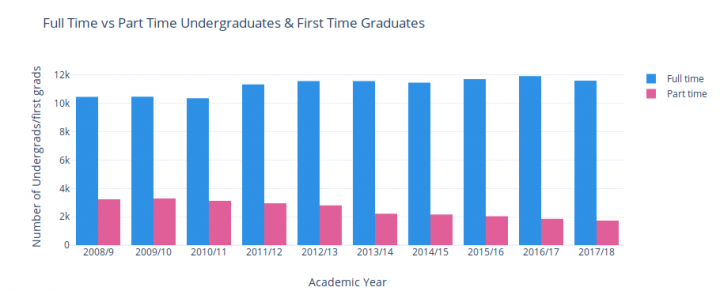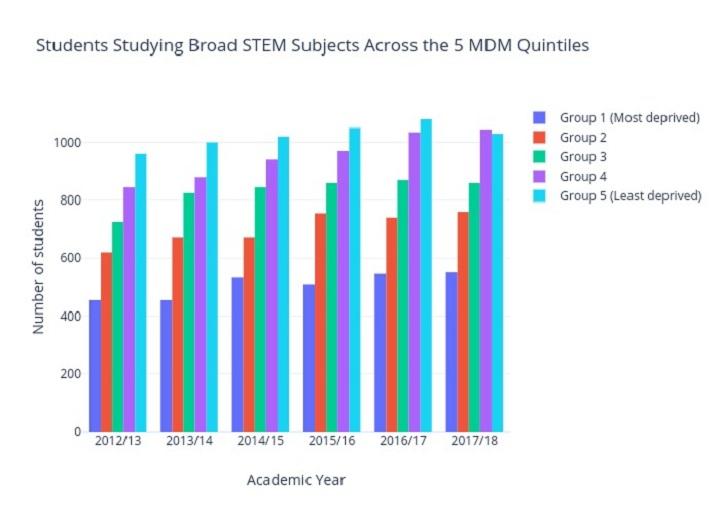
The amount of people graduating in STEM-related degree fields has steadily been increasing over the past few years, yet there is still a significant skills gap in Northern Ireland’s tech industry.
Around 86% of companies surveyed by the CBI (Confederation of British Industry) in 2019 said they were facing digital skills shortages and 93% expect their need for digital skills to grow over the coming years.
Education initiatives such as mTech.Academy are trying to engage more young people with STEM subjects to support talent in tech from an earlier age. However, Sync NI wanted to delve deeper to find out exactly who is graduating from tech-related qualifications, and how can Northern Ireland help engage those that aren’t?
Sync wanted to analyse the differences between various areas in Northern Ireland, based on data attained from The Data Times over a five-year span.
A report by the Department for the Economy (DfE) found that in the academic year 2013/14, a total of 2020 people graduated in mathematical sciences, computer science, engineering and technology degrees, of all levels (undergraduates, postgraduates, those studying part-time etc.)
RELATED: GCSE results show more female success in STEM subjects
This number has steadily increased, with the latest data showing nearly 2400 graduated in these disciplines in 2016/17. Around 1800 of graduates were male, with a much lower number of 545 females graduating from the same courses.
Only 475 females studied STEM subjects specifically as their first undergraduate degree, compared to a much larger number of approximately 1560 males.
Gender gaps in STEM are thought to be most likely due to social factors. A spokesperson from Queen’s University Belfast (QUB) commented that research across 34 countries suggested that “the more strongly people in a country believe in traditional gender stereotypes, the larger the gender differences in math performance in that country.”
The spokesperson continued that STEM initiatives at all levels tend to have positive effects on the motivation of girls and their performance in science: “They may also have delayed effects, with graduation rates one year reflecting initiatives put in place years before. The important thing is to monitor these initiatives to ensure they are being positively received and actually lead to improvements in girls’ subjective and objective experiences with STEM.”

The DfE shows data which is broken into five Multiple Deprivation Measures (MDM) groups; information unfortunately isn’t broken down regarding which students originate from which areas.
The MDM rank areas based on a number of factors; Income Deprivation (25%); Employment Deprivation (25%); Health Deprivation and Disability (15%); Education Skills and Training Deprivation (15%); Proximity to Services (10%); Living Environment (5%); and Crime and Disorder (5%).
The groups thus range from Group 1, which comprises of graduates from the most deprived areas, and then is scaled down to Group 5, to the least deprived.
Over time, the number of students graduating with a degree in any subject is surprisingly steadily decreasing. The new data from the DfE though shows that the general numbers for STEM subjects are on the rise.
It should be noted that 44 students with no postcodes are omitted from the DfE data, so these cannot be accounted for.

Broad STEM subjects as this graph depicts, relates to areas such as medicine, dentistry, and veterinary sciences. Narrow STEM is a subset of these relating to such disciplines as biological, physical, mathematical and computer sciences, as well as engineering and technology. Both broad and narrow STEM subjects have seen large increases in uptakes from the country’s most deprived areas.
Targeting earlier education
Earlier in 2019, The Council for the Curriculum, Examinations and Assessment (CCEA) reported that few girls are choosing to study computer-related subjects at GCSE and A-Level, especially in all-girls schools.
This year’s GCSE stats also showed a 1.4% decrease proportional entry for STEM subjects, but CCEA said it was too early to discern a trend. Nonetheless, although STEM subjects have more male entries as a whole, statistically females gained a higher percentage of higher grades at GCSE overall.
The A-level results in 2019 also revealed that more girls than boys entered science subjects for the first time.
Application rates from the most disadvantaged 18-year-olds to university between 2009 and 2018 have also increased dramatically increased across the UK, but particularly in Northern Ireland, according to a report regarding Patterns and Trends in UK Higher Education in 2018 by Universities UK.
RELATED: Former Belfast nightclub could turn into STEM education centre
When asked about what the country can do to engage more females in STEM subjects, QUB listed multiple initiatives it has developed to encourage this, including a ‘Girls in Maths’ event, ‘Women Creating Our Tech Future’ and open day events.
Sync NI contacted the DfE regarding all of this information. A spokesperson responded with an extract from their Women in STEM report, which said: “A girl’s motivation to pursue a Core STEM career can be influenced by self-confidence, stereotypes, educational environment, the perceived attractiveness of the sector and social factors including peers, parents, the presence of role models and media. Girls have lower levels of self- confidence in their ability than boys in mathematics and science and are less likely to continue in STEM education or pursue STEM careers, even within the context where they outperform boys.
"Interviews with women in STEM careers across NI found that resilience and determination to succeed, despite the potential barriers, are key. However, the interviewees recorded a supportive home environment where STEM experiences were the norm and the presence of strong role models and mentors as being every bit as important.”
RELATED: Earn as you learn: NI-wide IT apprenticeship scheme launches
The DfE provided Sync with a further report that shows in 2016/17, a higher proportion of males qualified in a STEM subject, but a higher proportion of females graduated with a first class or second class upper degree across all disciplines.
The department also said an initiative that may be encouraging people from more deprived areas to engage in STEM is their ‘I’m Happy’ programme, which is specifically aimed in areas of disadvantage.
It may be possible that more opportunities are becoming widely available for females and all those from lower socio-economic backgrounds. However these plans will not be brought to fruition for at least a few years, when the career pathways of today's children and teenagers show for it.